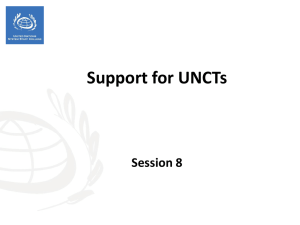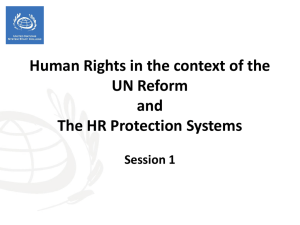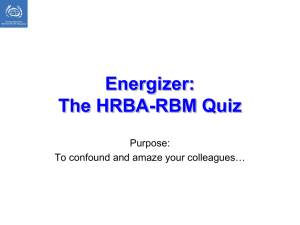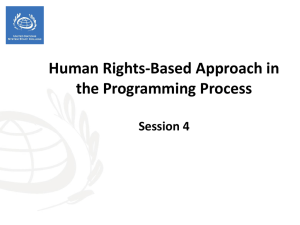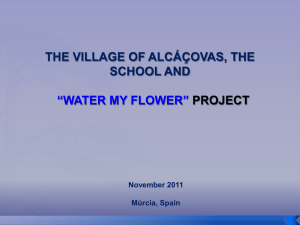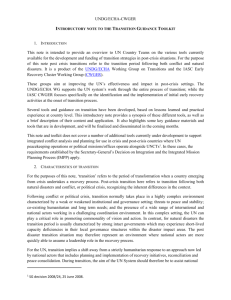Session 1 - HR and the UN Reform (Short)
advertisement
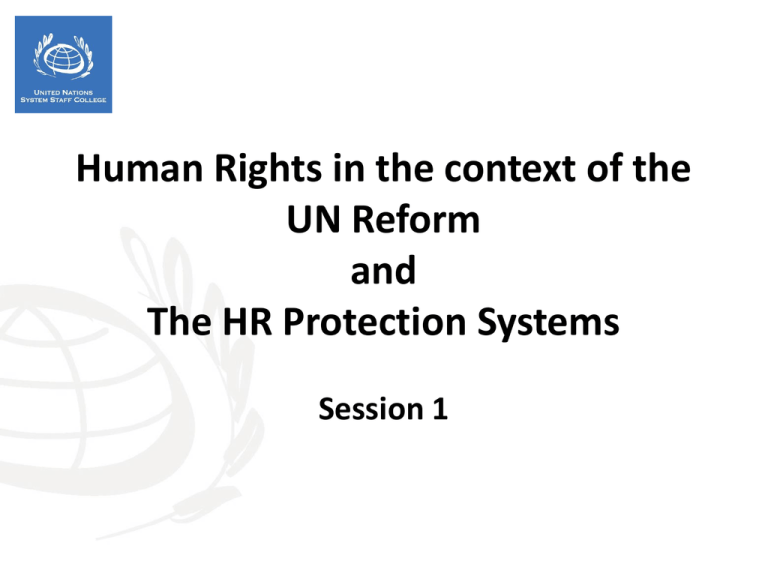
Human Rights in the context of the UN Reform and The HR Protection Systems Session 1 Session objectives • To provide information about the key milestones and influence of the human rights agenda in UN reform • To explain the relevance of human rights protection systems and the value they bring to country analysis and the UNDAF • To introduce the distinction between human rights and human rights-based approach Human rights in the UN ...To achieve international cooperation…in promoting and encouraging respect for human rights and for fundamental freedoms… --UN Charter, art. 1 UN Charter UDHR Cold War Development Human Rights Peace & Security humanitarian action Copenhagen Cairo UN Reform Agenda Vienna Beijing 1997/2010 The linkage between … Human development … and Human rights • Process of enhancing people’s capabilities • Expand choices and opportunities • Lead a life of respect and value • Claims to be protected from abuses and deprivations • Secure the freedom for a life and dignity • Requires capacity that development makes possible Milestones of HR Mainstreaming in UN 2002 Action 2 2000 1997ongoing UN Reform Millennium Declaratio n UN Reform 2005 2005 “In Larger Freedom” World Summit MDGs Review Outcome 2010 Summit UN system’s responses Agency policies and Guidelines integrate human rights Common Understanding on HRBA (2003) Updated CCA/UNDAF Guidelines Increasing no. of UNCTs adopting an HRBA Action 2 interagency plan (2003-2008) Delivering as One UN Integrated Missions/PKOs Resident Coordinators & Humanitarian Coordinators • Secretary-General: – Policy Committee decision on HR and Development (2008) UNDG Human Rights Mainstreaming Mechanism (UNDG-HRM) Senior-level UNDG mechanism to institutionalize support to RC/UNCTs on HR Objectives: • Policy and operational coherence on human rights and development • Support to RC and UNCT Leadership on human rights • Strengthen UNCT support to national capacity building efforts on human rights • Promoting system-wide advocacy on human rights Opportunities and challenges HRBA can contribute to: Strengthening normative and operational linkages Increasing coherence at country level Increasing UN’s effectiveness, impact and added value Three concepts: 1. Rights 2. Human rights 3. Global, Regional and National Protection systems What is a right? “That which a person is entitled to have, to do, or to receive from others, and which is enforceable by law.” What are human rights? • • • • Universal legal guarantees Civil, cultural, economic, political and social Protect human values (freedom, equality, dignity) Inherent to individuals and, to some extent, groups • Grounded in international norms and standards • Legally binding on States “Protection systems” “Legal frameworks, institutions, procedures and actors to ensure that international human rights norms and standards are promoted, respected, protected and fulfilled” Human rights instruments ICCPR ICESCR CERD CEDAW OPs CRC Other International Instruments (humanitarian, specialized agencies) UN Charter UDHR CRPD Fundamental Labour Conventions CAT CMW CPED National Constitutions and Laws Regional instruments Origin Mechanism Composition Coverage Periodicity Treaties Treaty Bodies Experts States Parties 4 Years Experts Universal State representatives Universal 4 Years Fundamental ILO Committee of Experts Labour on Application of Conv and Conventions Recom Experts States Parties 2 Years Other universal instruments of specialized agencies State representatives States Parties 4 Years (Committees) Charter HRC Special procedures (Special Rapporteurs, Working Groups...) Universal Periodic Review E.g., UNESCO Committee on Conv and Recomm/Ex Board/General Conference Treaty bodies Treaty bodies monitor and facilitate the implementation of the treaties through: Reviewing State Party reports and additional sources of information Adopting observations and recommendations Adopting General Comments on HR Standards contained in the treaty Examining individual complaints (some of them) Making confidential inquiries (some of them) Main Functions Mechanism Issue country Recommendations Further define the content of standards Treaty Bodies Concluding observations General comments Special Procedures Mission reports Thematic reports Universal Periodic Review UPR recommendations ----- ILO Committees Observations and direct requests/Conclusions General observations/ and general surveys/digest of decisions Other mechanisms under specialized agencies (e.g. UNESCO Committee on Conventions and Recommendations Reports ----- Human Rights Council (Charter-based bodies) • Promotes universal protection • Addresses and prevents violations • Develops international law • Reviews compliance of Member States • Respond to emergencies • International forum for dialogue Universal Periodic Review Special Procedures Advisory Committee Complaint Procedures Special procedures Thematic mandates (33) Country mandates (8) • Burundi • Cambodia • DPRK • Haiti • Myanmar • Palestinian territories • Somalia • Sudan ►Adequate housing ►African decent ►Arbitrary detention ►Sale of Children ►Cultural rights ►Discrimination against women in law and practice ►Education ►Enforced Disappearances ►Extrajudicial executions ►Extreme poverty ►Food ►Foreign debt ►Freedom of peaceful assembly & association ►Freedom of opinion & expression ►Freedom of religion ►Health ►Human rights defenders ►Independence of judges and lawyers ►Indigenous people ►Internally displaced persons ►Mercenaries ►Migrants ►Minority issues ►Racism ►Slavery ►International solidarity ►Terrorism ►Torture ►Toxic waste ►Trafficking in persons ►Transnational corporations and business ►Water and sanitation ►Violence against women Universal Periodic Review • Review the fulfillment of the human rights obligations of all countries • All Member States will be reviewed within 4 years (48 States per year) • Review will be carried out by “peers” (groups of three Member States) Provides its Own input State reports Civil society/NHRIs reports Recommendations UNCT Supports reporting Process Programmes support State implementation State Civil Society Awareness raising Regional human rights systems Instruments Mechanisms • European Convention for the Protection of Human Rights and Fundamental Freedoms • American Convention on Human Rights and San Jose Pact on Economic, Social and Cultural Rights • African Charter on Human and People’s Rights • Arab Charter on Human Rights • European Court on Human Rights • Inter-American Commission on Human Rights • Inter-American Court on Human Rights • African Commission on Human and People’s Rights • African Court on Human and People’s Rights • Arab Committee of HR Experts • ASEAN intergovernmental Commission on HR (AICHR) National protection system Ensuring sustainable respect for human rights requires: • Constitutional and legal framework • Effective institutions (parliament, government, judiciary, public administration, human rights institutions) • Procedures and processes including effective remedies • Policies and programmes, including awareness raising • Vibrant civil society and free media Human rights obligations Duty-bearers Right to water Respect Do not disconnect supply without due process Refrain from interfering with the enjoyment of rights Protect Pro-poor price regulation when supply is privatized Prevent others from interfering with the enjoyment of rights Fulfill Ensure, over time, everyone is connected Adopt appropriate measures towards full realization of rights Links between national, regional and international protection systems Global & regional protection are complementary Int’l Global & regional norms require national implementation Regional National National norms should be consistent with global and regional standards Check on…. …Status of ratification …Whether a Country’s pledge to the HRC exists …Recent UPR & Treaty Body recommendations …Recent UPR reports & State reports to Treaty Bodies …Recent visits of Special Rapporteurs or statements and communications on the country …Calendar of upcoming events and SP country visits …Recent outputs of monitoring mechanisms of specialized agency instruments (e.g. ILO supervisory bodies) www.ohchr.org/EN/Countries/Pages/HumanRightsintheWorld.aspx
